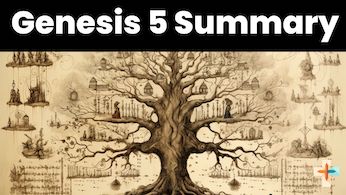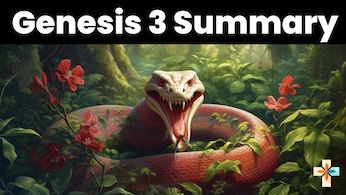Genesis 4 Summary Overview
Genesis 4 introduces the tragic story of Cain and Abel, the first siblings in human history, and the first recorded act of murder. This chapter highlights the continuing consequences of sin as it permeates human relationships and society. By examining the events of Genesis 4, we gain insight into the themes of jealousy, responsibility, and God’s mercy, which are relevant to our understanding of the human condition and our relationship with God.
I. The Birth of Cain and Abel (Genesis 4:1-2)
Adam and Eve give birth to their first two sons, Cain and Abel (4:1-2). Cain becomes a farmer, while Abel becomes a shepherd, signifying the different roles and occupations that emerge as humanity begins to populate the earth and develop civilization.

Where are you on your Spiritual Journey? Discover where you are on your Spiritual Journey in just 60 seconds and find out your next steps.
Take Your Spiritual Journey QuizII. The Sacrifices and God’s Favor (Genesis 4:3-5)
Both Cain and Abel bring offerings to God, but God shows favor to Abel’s offering over Cain’s (4:3-5). Abel’s offering is a firstborn from his flock, suggesting a greater level of reverence and devotion. God’s acceptance of Abel’s offering and rejection of Cain’s highlights the importance of approaching God with a humble and obedient heart.
III. Cain’s Anger and God’s Warning (Genesis 4:5-7)
Cain becomes angry and jealous because of God’s favor towards Abel (4:5). God confronts Cain, warning him of the danger of his anger and urging him to master the sin that is crouching at his door (4:6-7). This interaction underscores the importance of self-control and vigilance against the destructive power of sin.
IV. The Murder of Abel (Genesis 4:8)
Cain, overcome by jealousy and anger, kills his brother Abel (4:8). This act of violence marks the first recorded murder in human history and serves as a stark reminder of the devastating impact of sin on human relationships.
V. God’s Judgment on Cain (Genesis 4:9-15)
God confronts Cain about the murder of Abel (4:9). Cain denies responsibility, asking the famous question, “Am I my brother’s keeper?” (4:9). This response reveals the depth of Cain’s selfishness and his unwillingness to take responsibility for his actions.
God pronounces judgment on Cain, cursing him to be a wanderer and to experience difficulty in farming the land (4:10-12). Cain laments the severity of his punishment, fearing that he will be killed by others (4:13-14). Despite Cain’s crime, God shows mercy by providing him with a protective mark, ensuring that no one will take vengeance on him (4:15).
VI. The Descendants of Cain and the Spread of Sin (Genesis 4:16-24)
Cain leaves God’s presence and settles in the land of Nod, where he starts a family (4:16-17). The descendants of Cain continue to build civilization, engaging in various pursuits such as city-building, animal husbandry, music, and metalworking (4:17-22). However, the spread of sin is also evident in the genealogy of Cain, as evidenced by Lamech, a violent man who boasts of his acts of vengeance and murder (4:23-24).
VII. The Birth of Seth and the Line of Promise (Genesis 4:25-26)
In the midst of the darkness and sin of Cain’s lineage, hope is reintroduced through the birth of Seth, a son born to Adam and Eve after Abel’s death (4:25). Seth represents a new line of promise, and during his time, people begin to call upon the name of the Lord (4:26). This development signifies a renewal of faith and the continuation of God’s redemptive plan despite the pervasive presence of sin.
Conclusion:
Genesis 4 offers a sobering account of the far-reaching consequences of sin as it infiltrates human relationships, leading to jealousy, violence, and murder. Through the story of Cain and Abel, we are reminded of our responsibility to one another as well as the importance of approaching God with humility and sincerity. Furthermore, the chapter highlights God’s mercy, even in the face of severe disobedience, as evidenced by His protection of Cain.
The birth of Seth and the continuation of the line of promise reveal that, despite humanity’s propensity for sin, God’s redemptive plan persists. As we reflect on the events and lessons of Genesis 4, we are encouraged to remain vigilant against the destructive power of sin, to take responsibility for our actions, and to trust in God’s ongoing work of redemption and restoration throughout history.
Michael Ayers
As a dedicated single father, author, teacher, and web developer, I've built a successful entrepreneurial career. I'm responsible for designing, coding, writing, and producing all the content on this website and have generated over 1,000,000 plus page views on all the websites I manage. I hope you enjoy this site.
Where are you on your Spiritual Journey? Discover where you are on your Spiritual Journey in just 60 seconds and find out your next steps.
Take Your Spiritual Journey Quiz

